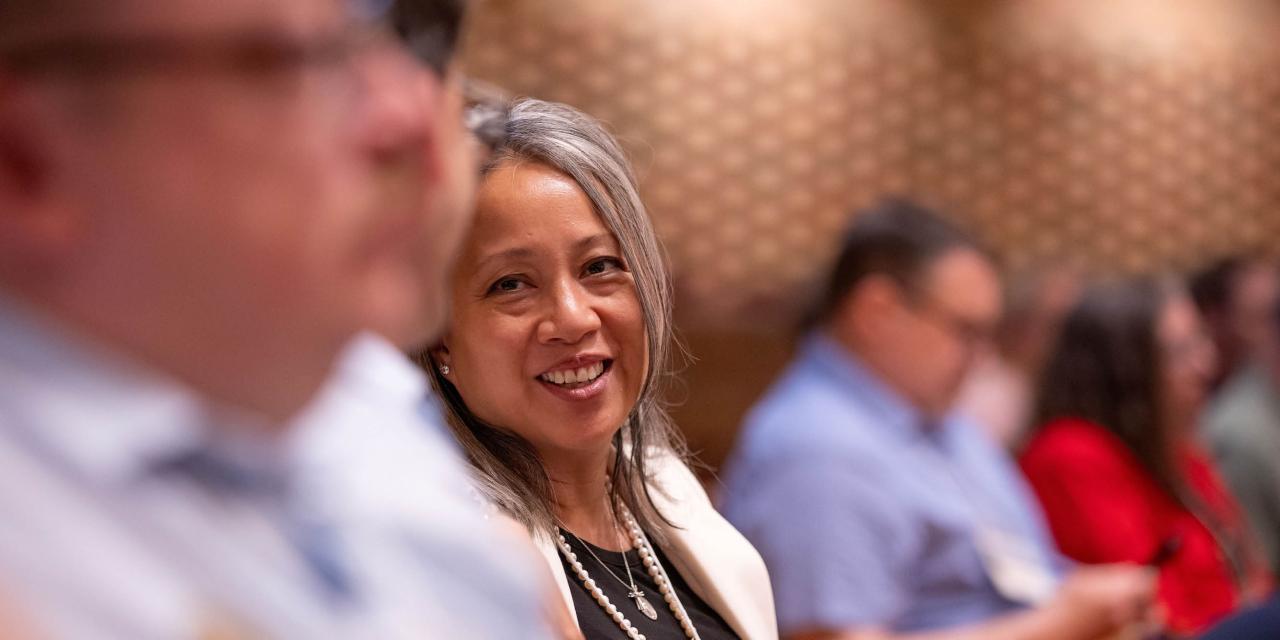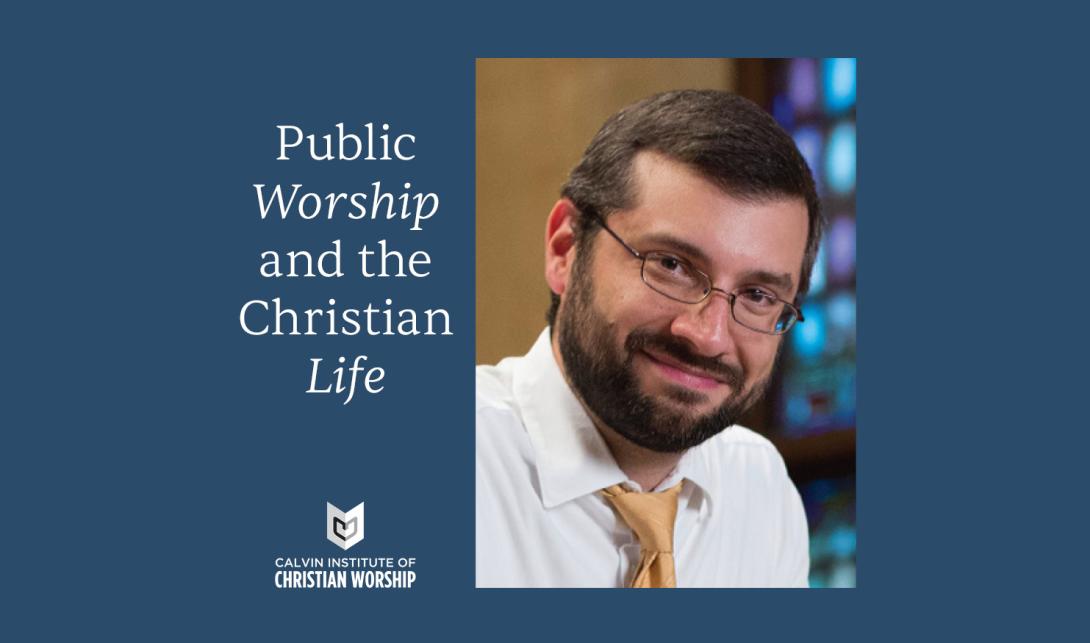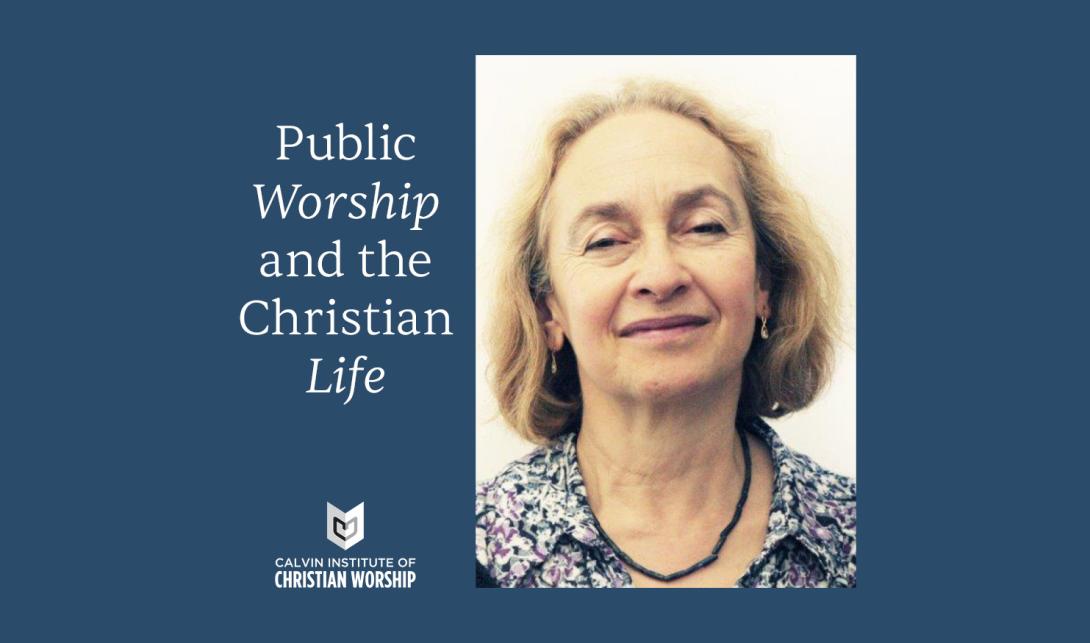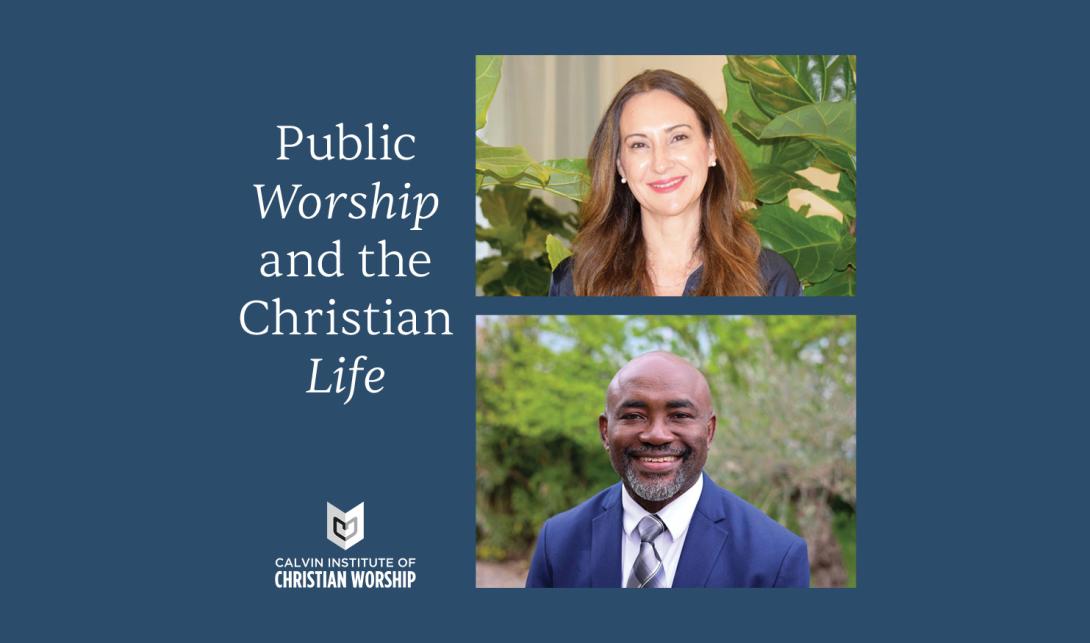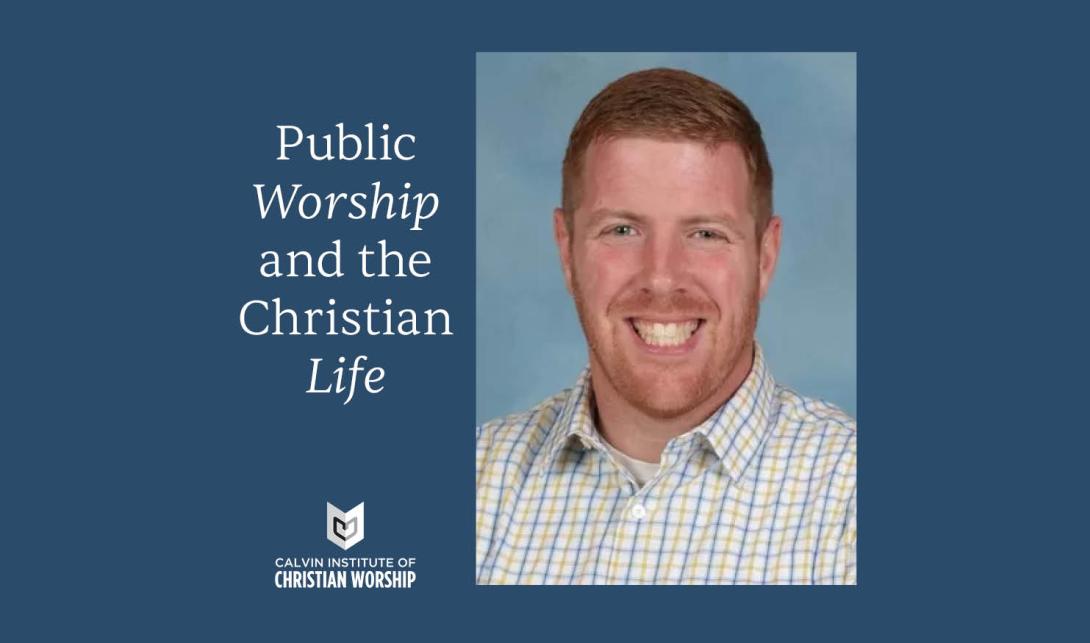Welcome to Public Worship and the Christian Life, a podcast by the Calvin Institute of Christian Worship. In this series of conversations hosted by Calvin Institute of Christian Worship staff members, we invite you to explore connections between the public worship practices of congregations and the dynamics of Christian life and witness in a variety of cultural contexts, including places of work, education, community development, artistic and media engagement, and more. Our conversation partners represent many areas of expertise and a range of Christian traditions offering insights to challenge us as we discern the shape of faithful worship and witness in our own communities. We pray this podcast will nurture curiosity and provide indispensable countercultural wisdom for our life together in Christ.
In this episode, New Testament scholar Brian Blount talks with Noel Snyder about cultivating an apocalyptic perspective and what it means to preach the resurrection all year long.
Noel Snyder:
Hello and welcome. My name is Noel Snyder, and I'm a program manager at the Calvin Institute of Christian Worship. I'm so pleased to have with me today our special guest, Reverend Dr. Brian Blount. Welcome, Brian.
Brian Blount:
Thank you, Noel.
Noel Snyder:
Just a quick introduction. Dr. Blunt is the president of Union Presbyterian Seminary in Richmond, Virginia, where he also teaches in the area of New Testament. He has written books on the apocalypse of John, a.k.a. the book of Revelation, as well as the gospel of Mark. And one of the things that is unique about his approach is that he brings a special focus not only to what it means to interpret these texts for today, but also what it means to preach these texts in our current cultural and historical context, which brings me to the topic of our conversation today. In 2014, Dr. Blount published a marvelous book called Invasion of the Dead: Preaching Resurrection, and in it he explores themes of sin and death, resurrection, and life, and particularly what it means to preach resurrection, in this case from the book of Revelation and the letters of Paul as well as the gospel of Mark. So I'm wondering, Brian, if we can start right there and if you can just tell us a little bit about the story behind the book. How did it come about? Why did you write it?
Brian Blount:
Yes, I was invited by the faculty at Yale Divinity School to come to the Beecher Lectures for 2011. And I began to think what might I speak about. As you probably know, those lectures are focused on homiletics and the particular field a person is coming from. So for me, it was New Testament studies and their connection with homiletics and how one might develop ideas and thoughts around New Testament inquiry with preaching and teaching. And so I began to think about material related to apocalyptic understanding. I had done, as you said, the commentary on the book of Revelation. I had done a great deal of work in the gospel of Mark, looking at the gospel from an apocalyptic perspective, the whole understanding of trying to see how the biblical materials were revealing God's future intent in the present moment. So I wanted to do something that gave us a contemporary look, or gave preachers a contemporary look, at apocalyptic, how we could preach and teach apocalyptic and contemporary circumstances and churches and in other venues. So my focus was primarily on that. And then as I began to research more and more about apocalyptic, it dawned on me that I was very fascinated with resurrection as an apocalyptic image and how resurrection is, if it's going to be understood correctly, must be understood from an apocalyptic perspective. That is how God reveals God's future intent in the present moment through the resurrection of Jesus, and then how that resurrection has implications for the resurrection of all the dead.
And that then brought me the thematic understanding of God's invasion in Jesus--God's invasion first in Jesus through his incarnation, but then the ultimate invasion through Jesus' resurrection: Jesus killed on the cross, but then God reclaiming the orientation and the commitment to life by raising Jesus from the dead. And then promising that at Jesus' coming, the Parousia, Jesus' next coming, his second coming, that all the dead would be raised. And so you have this sense then of an invasion of all the dead at the end of time, bringing the ultimate experience of life--eternal life. So there's this wonderful conundrum of the dead bringing life. And then I wanted to research that more and more through a contemporary lens, which then brought me to all manner of popular culture imagery, like zombies and all these kinds of images, which I also explore in the book. But the whole idea here is that instead of a virus that causes zombieism that you have in popular culture books and literature and movies, there is this virus of life that brings an invasion of the dead, who at the end of time creates the ultimate experience of eternal life for all. So starting with how do I preach apocalyptic to a contemporary world, and then moving from that to resurrection, and then moving from resurrection to the understanding of God's invasion through Jesus' incarnation, resurrection, and then the resurrection of all of the dead.
Noel Snyder:
Wow. What a movement of thought there and tracing the way that unfolds throughout the biblical texts! I think one of the things that I imagine our listeners will find helpful, even with what you've said already, is when you are using the word "apocalyptic," you said, "This is God's future intent in the present moment." I think for a lot of people, "apocalyptic" in general, that idea or that word means something different in popular usage. And so preachers in churches have a hard time knowing what to do with it and knowing how to approach those texts. And then also listeners of preaching have a difficult time understanding what is being said because of that word "apocalyptic." So was that one of the puzzles that you were trying to untangle as you were exploring this material?
Brian Blount:
Most definitely. As a matter of fact, one of the things I say in the book is that Christianity has lost title to a term that is most Christian in its understanding: apocalyptic. It has become a popular culture term and then has become twisted in its use in popular culture. So when we think typically today of the term apocalyptic, we think chaos. We think cataclysm. We think end of the world. We think pessimism. We think hopelessness. And so one of the images I use in the book Invasion of the Dead--that's why I used the zombie image. It's a particular apocalyptic understanding of the world from a popular culture perspective. It's hopeless. It is universal. But it is a sense where all except a small remnant are doomed, and that remnant must struggle and struggle with an ever more hopeless path on the horizon.
When you look at biblical apocalyptic, however, you start from the term itself. As you know, the term apocalyptic comes from the Greek which means "to reveal." That's why the book of Revelation, which is the apokalupsis of Jesus Christ--that's the way John titles it in the Greek, the revelation of Jesus Christ--what is being revealed? That's the question. Is horror and terror and pessimism and hopelessness being revealed? No, that's not what the biblical materials are all about. They give us a presentation of God breaking in, the inbreaking of God's kingdom, being revealed in the life of Jesus of Nazareth. That's the story of the apocalyptic story of the gospels. What's being revealed? God's intent. How is God's intent being revealed? Well, through the ministry of Jesus of Nazareth. That is in essence God's in-time expectation for human living made visible in the present moment in the life and ministry of Jesus. And of course we know how difficult that is for the present to accept that future intent of being with the lepers, of being with women, of being with tax collectors and sinners, of breaking the law when the law isn't being oriented towards healing and wholeness. That kind of troubling understanding of what God's intent is when it's revealed. Jesus, of course, gets into trouble for revealing it.
So that's the conflict that then happens with apocalyptic material. And then out of that conflict that leads to Jesus' death, God then reveals again that . . . Jesus did represent God's intent and God validates that by resurrecting Jesus, and then proclaiming that Jesus will return to reclaim all those who are following Jesus' path of revealing God's future intent in the present moment.
So what I try to do is to suggest we need to reclaim the language and imagery of apocalyptic. It is even in the book of Revelation with all of its cataclysm and horror, an ultimately positive, hopeful image--the new heaven and the new earth is what we get. It's not a destructive, destroyed earth. It is not an earth that has to be thrown away and then reclaimed. No, it is the re-formation of the earth that we have. It is "Behold, I make all things new." I don't throw out the old and then create something new. I take what we have. This is God speaking. "Behold, I make all things new." That is the apocalyptic intent: to reveal God's goodness in creation at the end time through the invasion of God's reign in the present time. And we can participate in that in-breaking right now, and we can look forward to that in-breaking in its consummate sense at the end of time. So we need to reclaim that as Christians in our preaching and in our teaching. And that's what I was hoping that little book Invasion of the Dead could start a conversation about.
Noel Snyder:
Yes. So good. And it sings when you talk about this material, and you talk about how truly powerful it is if we could wrap our minds around it and allow it to really sink in. So I'm wondering: you start with this apocalyptic literature and this idea, and you talk about a resurrection through that lens, and then you bring in this imagery of zombie/modern imagery to help us understand. And I found that very helpful for helping us understand these images that are being spoken of in scripture, especially in Paul's letters. So I'm wondering what has been some of the response to your book now that you've put it out there, both in the form of the Beecher Lectures when you delivered them, but also now it's in a more popularly accessible form in the book--what's been the response? How have people engaged so far? How are you hoping that people will continue to engage?
Brian Blount:
The immediate response I had from faculty and alumni and students at Yale was very positive. It was an exciting exchange about how we can look at this material through new lenses and particularly the popular culture lens of looking at it through the--as you might imagine--talk about zombies and the undead and all of that. It was unique for them. I think I was the first person who brought that to the Beecher Lecture format. So I was excited about having conversation with them about something so unique and unusual in the scholarly setting at Yale. So that was fun, but they understood what I was trying to do, which was to say, we need to reclaim apocalyptic. And it's not that popular culture takes kind of the germ of apocalyptic and twists it in its own way. We need to twist it back in the way that these biblical materials intended. So that was a very good and helpful and exciting conversation for me.
Afterwards, I've gotten wonderful emails and phone calls, snail mail--that still happens every once in a while--from pastors around the country. They were the persons I saw as the audience for the book. They were telling me that they were using this in their Easter preparation for how they were going to preach and teach resurrection in and around Easter, which I found really exciting. So I got these Easter sermons that were based on the work in Invasion of the Dead, seeing the Easter moment as God's invasion, but then also talking to their congregations about zombies and why it's obviously not what God was intending and how we have misappropriated and misunderstood apocalyptic, and how the resurrection refocused understanding on the resurrection can change that.
So I have these ministers sharing sermons with zombies in them, which was exciting in and of itself, but then making the transition that I was suggesting that we make in the book: to see the resurrection as God's invasion, and to see us participating in that, both now and in the future when Jesus comes to reclaim all of the elect at the general resurrection of the day. So that was exciting to see.
But the most exciting thing for me is, in the book, I was suggesting that we should not leave resurrection for Easter time. That should not be the only time we speak about the resurrection, because the resurrection is central and core to the being of who we are as Christians. Paul says in 1 Corinthians 15, "If Jesus wasn't raised from the dead, then your faith is in vain." Everything hinges on that. That's an apocalyptic moment; it's a transformational moment. Why don't we preach that more often than just at Easter? It's important at Easter, but the resurrection has some powerful implications for who and what we are as believers in Christ Jesus as God's representative as the one who brings God's intent, God's end time intentions into the present moment. The resurrection has powerful meaning for that. And we should be preaching in and about the stories of the resurrection throughout the Christian year--not every Sunday, but certainly more often than we do. So that was one of my causes behind writing the book. And I've found that in the letters and other kinds of correspondence that I've received from pastors, they've taken up that charge, and that excites me a great deal to know I've had a little bit behind encouraging pastors and others to do that, to preach and teach it in different settings other than Easter.
Host:
You are listening to Public Worship and the Christian Life: Conversations for the Journey, a podcast produced by the Calvin Institute of Christian Worship. Check out our website at worship.calvin.edu for resources related to this topic and many other aspects of public worship.
Noel Snyder:
The things that strikes me, even as you're talking here and reading the book as well, is just this combination that you bring of scholarly precision--I think that's the right word for it. There is a precision of the argument that you're taking us through, and yet it's got such a homiletical power, you know, this stuff preaches as you're talking to us about it. And I imagine that wasn't easy or natural, like falling off a log, for you. So I'm wondering as you're writing the lectures, as you were editing it into book form, and then since you've published the book, if your thinking has changed in any way along the way.
Brian Blount:
It has changed only to the degree that I think I'm more committed to pressing the apocalyptic agenda than I was even before and while I was writing that book. I've become more convinced, given the circumstances in which we find ourselves in the world today, that we need to reclaim the true essence and meaning of "apocalyptic" and the true essence and meaning of God's intent in the sending, the invasion of our world with Jesus, and how we can be invasive representatives of God's intent in the present as well. So for me, it's been less a changing of my thinking than a more intensifying of my thinking. When I look at the book of Revelation, for example, John becomes more and more intense about getting his people to respond, to witness to God's, to Christ's lordship in the world. He becomes more and more intense as it appears that lordship is more and more threatened by Rome's power and Rome's force.
So when we live in a world where we become more and more, I think, moving away from the commitments that seem so important from the biblical perspective. When we live in tensions in our world that seem much more destructive, when we seem to be less moving toward the intent that God has for us as humankind and human community and more toward a destructive picture and presentation of polarization of human community, it's at those moments that you want to intensify teaching about God's ultimate intent and how we can be invasive representatives of that intent. So as time becomes more challenging, I think we need to become more serious and intense about how we present this kind of material.
Noel Snyder:
Yes. And when you're talking about invasive representatives, you're talking about something that is fundamentally different than the tools of the present age, you know, the sin and death tools. You're talking about invasive presence of resurrection life.
Brian Blount:
Yes. That's my goal in that book: invasive presence of resurrected life. How can we become contagions of resurrection life that infest others with that same contagion? So instead of being carriers of sin or carriers of a zombie virus, how can we become carriers of this eternal life virus that is represented in Jesus' life and in the expectation for Jesus's return? How can we become carriers of that? That for me is an exciting new way to look at what we do as disciples.
Noel Snyder:
Yes. Well, I'm with the Calvin Institute of Christian Worship, and so when we are dealing with texts of all sorts that are put out on preaching or theology or whatever it is, oftentimes we're asking the question, how does this connect to worship? So your book is about preaching specifically, so already it's set within that worship context, but I'm wondering if there are any other ways that you see connections with worship practices for congregations, whether it's in North America or beyond North America.
Brian Blount:
As you know, in the book one of the things I did was to add to the lectures, actual sermons so that . . . one could not only write a lecture about the book of Revelation or Paul's materials or the gospel of Mark from this perspective, but then to give a sermon that lifted that out. So the first thing I wanted to do was say, here's an example from my own perspective of how one can preach this using particular texts from Mark, Revelation, and Paul's letters. I think in the way in which we do liturgy, we can think about how liturgy can represent invasive engagement in the world and the hopefulness that's represented in resurrection. I preach, for example, in Montreat, one of the Presbyterian church camps, and there the worship leader took the imagery I was using and created not only a word liturgy, but art that represented inbreaking. And all of that became a way in which the congregation therefore participated in the visualizing of this apocalyptic kind of scenario, and also could participate in the speaking of it as the liturgy calls them into responding together with words that suggested this understanding that God was breaking in and that we were to become representatives of that inbreaking in how we live and how we responded to the Word, both the scriptures and the interpretation of the scriptures through the sermon. I think those are key ways in worship--how we craft sermons, how we think about liturgy, how we use art in the worship space, how we choose music--that's another place where we can use hymns, but then other kinds of music that respond to the same type of imagery to create a wholeness within worship that thinks and has the congregation thinking and praying and speaking in an invasive way.
Noel Snyder:
Yes, still I'm so struck by the way that you're using that word "invasive" and how it's such a wonderful turning over of how we typically think of "invasion" or "invasive" and the invasive power of resurrection life. You've talked about how that is something that you're so now convicted about--reclaiming apocalyptic, understanding that invasive presence of resurrection life. What other opportunities or challenges might this present then for worshiping communities? What would that mean to really take hold of what you're talking about today?
Brian Blount:
I think you noted one of the concerns at the beginning and that is that one can move into apocalyptic, but not really understand it, and then misunderstand it and misappropriate it. That's one of my big concerns which is why it's important to have more people writing and reading and teaching on apocalyptic and how to understand it. One of my big concerns with the book of Revelation is that it's often misused as either predictions about the future, or trying to identify in a literal sense who is the dragon, and all of these types of things that I find difficult. And one misses the message that the author of the biblical material is trying to get across. So one key concern on my mind is always that we teach properly what apocalyptic means, and there's always that concern that it'll move toward the negative as opposed to the positive. So I'm always concerned about that.
But the more hopeful sense is that the more we get a clearer picture of what these biblical authors were intending, the more we'll be drawn into the apocalyptic cause as disciples. And for me, that's the exciting thing behind this. What would it look like if an individual church or a group of churches or a Christian community began to sense not only an appreciation for God's invasive presence as Jesus, as the reign of God is at hand, not only to appreciate that indicative reality, but to take that indicative reality on as an imperative expectation. God's presence is in our midst; how do we respond to it? By becoming conduits of that invasive force ourselves, and through preaching and teaching, and then modeling and how we live in discipleship. I think we as Christian leaders and teachers can help our congregations find pathways. What I don't want to do is to suggest that there is only one way and the way I'm suggesting is how you live out the invasive reality of what God is doing in the world, but to suggest examples from my own teaching and discipleship that may be encouraging for others who might see a different path, but still be encouraged by the same impulse.
Noel Snyder:
Yes. That's so helpful. Thank you. I'm wondering, finally, one final word from you, if I can ask you if there's anything in particular about the resurrection that you learned or that you feel that you've learned through the act of preaching itself--was there anything or anything that you think preachers themselves can learn through the act of preaching on the idea or the themes of resurrection?
Brian Blount:
That's a very good question. I think for me, I have learned, and I think others can learn, the more you preach resurrection, the more you become a part of a communal reengagement with the concept, the reality, and the truth of the resurrection. I have learned that many Christians who've talked to me about the book have just a general sense of resurrection and really aren't really sure what they believe about it. There are some who have a sense that, yes, maybe Jesus was raised from the dead, but was Jesus an outlier and unique thing that happened? And of course that's already happening in the first century because Paul is challenging his people in the letter to the Corinthians, where men are saying, "Well, God may have done that with Jesus, but God's not going to do that with all of us. That was a one - time event." That's what prompts Paul to say, well, if there's no resurrection of all the dead, Jesus wasn't raised from the dead, and if that doesn't have implications for us, then our faith is in vain. I think the more we preach and teach from it, the more we get the sense of its power, its reality, and its truth and the more we encourage a sense of that same attention to reality, truth, and power in those who listen and hear. So what I've learned is by not just believing, but by teaching and preaching resurrection, you become a force for encouraging the believing and concrete living-out of the implications of resurrection in ways that are much more defined and concrete and specific. So I think we have that kind of role and that kind of responsibility. And that's why it's important to keep preaching it.
Noel Snyder:
Yes, to keep preaching it. Amen. This has been such a great conversation. Very inspiring to hear you talk about all of these things. I'm so excited for our listeners to hear it and to hear how the imagery of apocalyptic and the themes of resurrection that we find throughout the New Testament can really come alive in the life of an average person living out their Christian discipleship, and what it means to really engage seriously as disciples in this time and place, especially the way that our world is today, and how essential that is. I am so thankful for your sharing with us today. And I want to say thank you, Brian, for being with us.
Brian Blount:
It has been my pleasure. I'm grateful for this opportunity, for the invitation, and it's been my pleasure.
Noel Snyder:
Thank you.
Host:
Thanks for listening. We invite you to visit our website at worship.calvin.edu to learn more about the Calvin Institute of Christian Worship, an interdisciplinary study and ministry center dedicated to the scholarly study of the theology, history, and practice of Christian worship and the renewal of worship in worshiping communities across North America and beyond.
